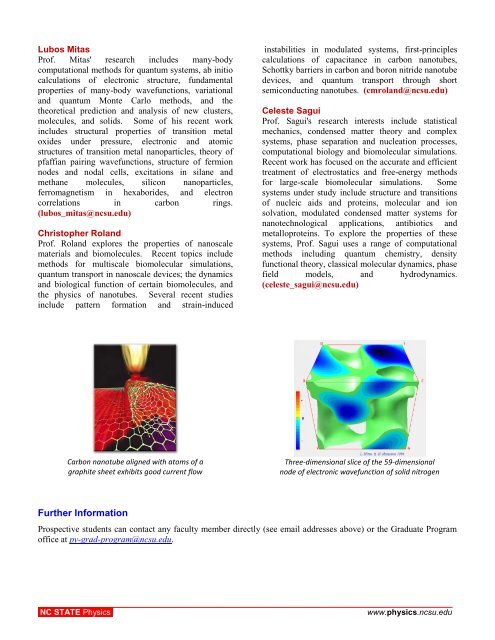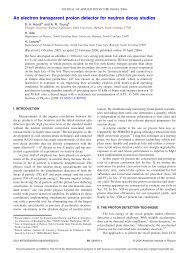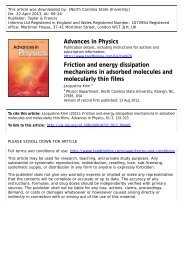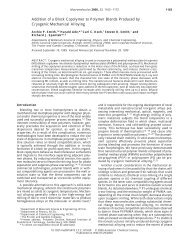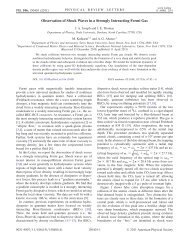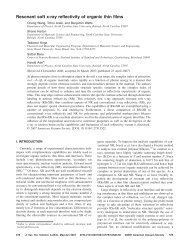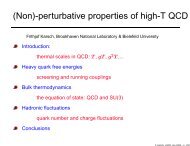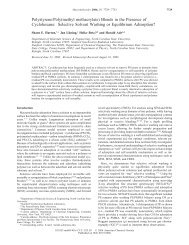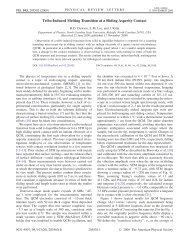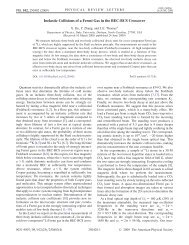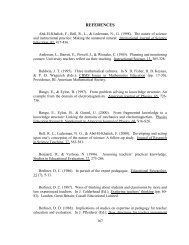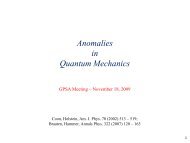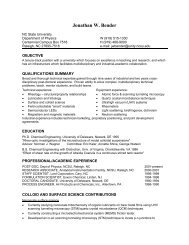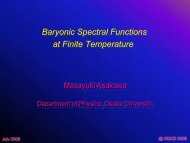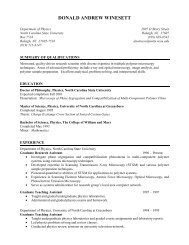Physics Graduate Brochure - Physics - North Carolina State University
Physics Graduate Brochure - Physics - North Carolina State University
Physics Graduate Brochure - Physics - North Carolina State University
You also want an ePaper? Increase the reach of your titles
YUMPU automatically turns print PDFs into web optimized ePapers that Google loves.
Lubos Mitas<br />
Prof. Mitas' research includes many-body<br />
computational methods for quantum systems, ab initio<br />
calculations of electronic structure, fundamental<br />
properties of many-body wavefunctions, variational<br />
and quantum Monte Carlo methods, and the<br />
theoretical prediction and analysis of new clusters,<br />
molecules, and solids. Some of his recent work<br />
includes structural properties of transition metal<br />
oxides under pressure, electronic and atomic<br />
structures of transition metal nanoparticles, theory of<br />
pfaffian pairing wavefunctions, structure of fermion<br />
nodes and nodal cells, excitations in silane and<br />
methane molecules, silicon nanoparticles,<br />
ferromagnetism in hexaborides, and electron<br />
correlations in carbon rings.<br />
(lubos_mitas@ncsu.edu)<br />
Christopher Roland<br />
Prof. Roland explores the properties of nanoscale<br />
materials and biomolecules. Recent topics include<br />
methods for multiscale biomolecular simulations,<br />
quantum transport in nanoscale devices; the dynamics<br />
and biological function of certain biomolecules, and<br />
the physics of nanotubes. Several recent studies<br />
include pattern formation and strain-induced<br />
instabilities in modulated systems, first-principles<br />
calculations of capacitance in carbon nanotubes,<br />
Schottky barriers in carbon and boron nitride nanotube<br />
devices, and quantum transport through short<br />
semiconducting nanotubes. (cmroland@ncsu.edu)<br />
Celeste Sagui<br />
Prof. Sagui's research interests include statistical<br />
mechanics, condensed matter theory and complex<br />
systems, phase separation and nucleation processes,<br />
computational biology and biomolecular simulations.<br />
Recent work has focused on the accurate and efficient<br />
treatment of electrostatics and free-energy methods<br />
for large-scale biomolecular simulations. Some<br />
systems under study include structure and transitions<br />
of nucleic aids and proteins, molecular and ion<br />
solvation, modulated condensed matter systems for<br />
nanotechnological applications, antibiotics and<br />
metalloproteins. To explore the properties of these<br />
systems, Prof. Sagui uses a range of computational<br />
methods including quantum chemistry, density<br />
functional theory, classical molecular dynamics, phase<br />
field models, and hydrodynamics.<br />
(celeste_sagui@ncsu.edu)<br />
Carbon nanotube aligned with atoms of a<br />
graphite sheet exhibits good current flow<br />
Three-dimensional slice of the 59-dimensional<br />
node of electronic wavefunction of solid nitrogen<br />
Further Information<br />
Prospective students can contact any faculty member directly (see email addresses above) or the <strong>Graduate</strong> Program<br />
office at py-grad-program@ncsu.edu.<br />
.NC STATE <strong>Physics</strong>.<br />
www.physics.ncsu.edu


